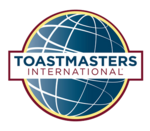Toastmasters International facts for kids
 |
|
| Abbreviation | TI, TM |
|---|---|
| Formation | October 22, 1924 |
| Type | INGO |
| Legal status | Non-profit organization |
| Purpose | Educational |
| Headquarters | 9127 South Jamaica Street, Meridian, Colorado, US |
|
Region
|
Worldwide |
|
Membership (2020)
|
364,000 |
|
International President
|
Radhi Spear |
|
Revenue (2016)
|
$34,255,739 |
|
Staff (2016)
|
198 |
|
Volunteers (2016)
|
117,789 |
Toastmasters International (TI) is a worldwide group that helps people become better at talking in front of others. It also helps them become strong leaders. This non-profit organization has clubs all over the world. Members learn how to speak clearly, listen well, and lead meetings.
Contents
How Toastmasters Started
The idea for Toastmasters began a long time ago. In 1905, a man named Dr. Ralph C. Smedley worked at a YMCA in Illinois. He wanted to help young men learn to speak better. He started a club where they could practice giving short speeches. Older members would give helpful tips. This first club was called "a Toastmasters Club."
Dr. Smedley saw how much the young men improved. He later moved to Santa Ana, California. There, on October 22, 1924, he officially started the first Toastmasters club. The organization became a legal non-profit group in California in 1932.
Growing Around the World
Toastmasters quickly grew beyond the United States. The first club outside the US opened in Vancouver, Canada, in 1932. For many years, only men could join Toastmasters. However, in 1973, the organization began to welcome women as members.
By 1999, Toastmasters International had 170,000 members in 68 countries. By 2016, there were 16,000 clubs worldwide. This shows how popular and helpful the program has become for people everywhere.
How a Toastmasters Club Works
Toastmasters International uses a local club system. Most clubs have about 22 members. They usually meet every week or every other week. Some clubs meet in the morning, while others meet in the evening. Each club is like its own small group.
What Happens at a Meeting
Every meeting has a plan with organized speeches. Members give speeches they have prepared. After a speech, another experienced member gives helpful feedback. This feedback helps the speaker improve for next time.
A fun part of the meeting is called "Table Topics." This is when members give short, unplanned speeches. The Topicsmaster gives them a topic on the spot. The goal is to think quickly and speak clearly with little preparation. In some clubs, members vote for the best Table Topics speaker.
Learning and Growing with Toastmasters
Toastmasters International focuses a lot on helping members build their public speaking and leadership skills. They have special programs to guide members.
The Pathways Program
The main learning system is called Pathways. It has eleven different learning paths. These paths are designed to fit what each member needs. They cover skills like Public Speaking, Interpersonal Communication (how to talk with others), Management, Strategic Leadership, and Confidence. Each path has 14 projects.
Pathways uses online materials and printed books. This was the first time Toastmasters used modern technology for its program. The content is available in English and many other languages.
Other Learning Opportunities
Speechcraft is another program. It's a shorter course, lasting 4 to 8 weeks. Experienced Toastmasters members teach it to people who are not yet members. It's a great way to try out Toastmasters.
Members can also develop leadership skills by leading their club. They can also help at higher levels, like in an area or district. Participating in speech contests also helps members grow their skills.
The World Public Speaking Championship
Toastmasters holds a big international public speaking contest every year. It's officially called the Toastmasters International World Champion of Public Speaking. This event happens at their International Convention in August.
How the Contest Works
The championship started in 1938. It is the world's largest public speaking contest. Over 33,000 people from 141 countries take part. It takes about six months of smaller contests to reach the semifinals. In 2018, 106 people made it to that stage.
Only ten people reach the final round. Judges look at several things when scoring speeches. They check the content, how the speaker uses gestures, how well the speech is organized, and the speaker's overall style.
See also
 In Spanish: Toastmasters International para niños
In Spanish: Toastmasters International para niños
- Association of Speakers Clubs
- Communications training
- Dale Carnegie
- Australian Rostrum
- List of recreational organizations
- Public speaking
- Speakers Bureau
 | Toni Morrison |
 | Barack Obama |
 | Martin Luther King Jr. |
 | Ralph Bunche |

